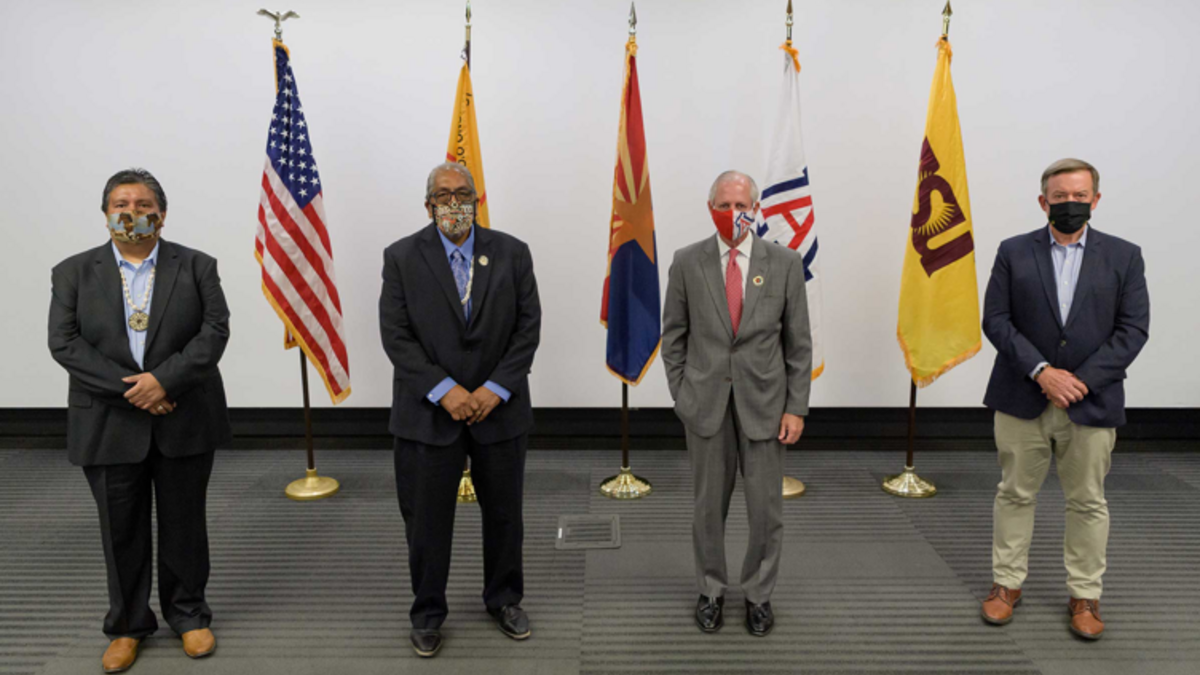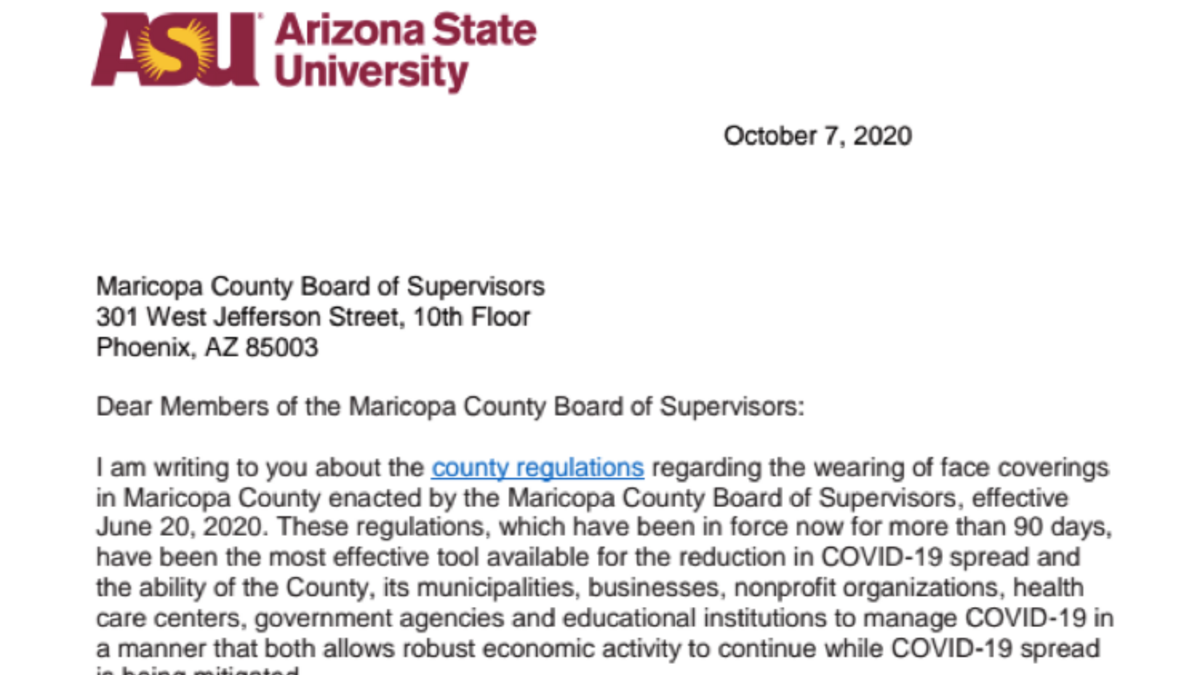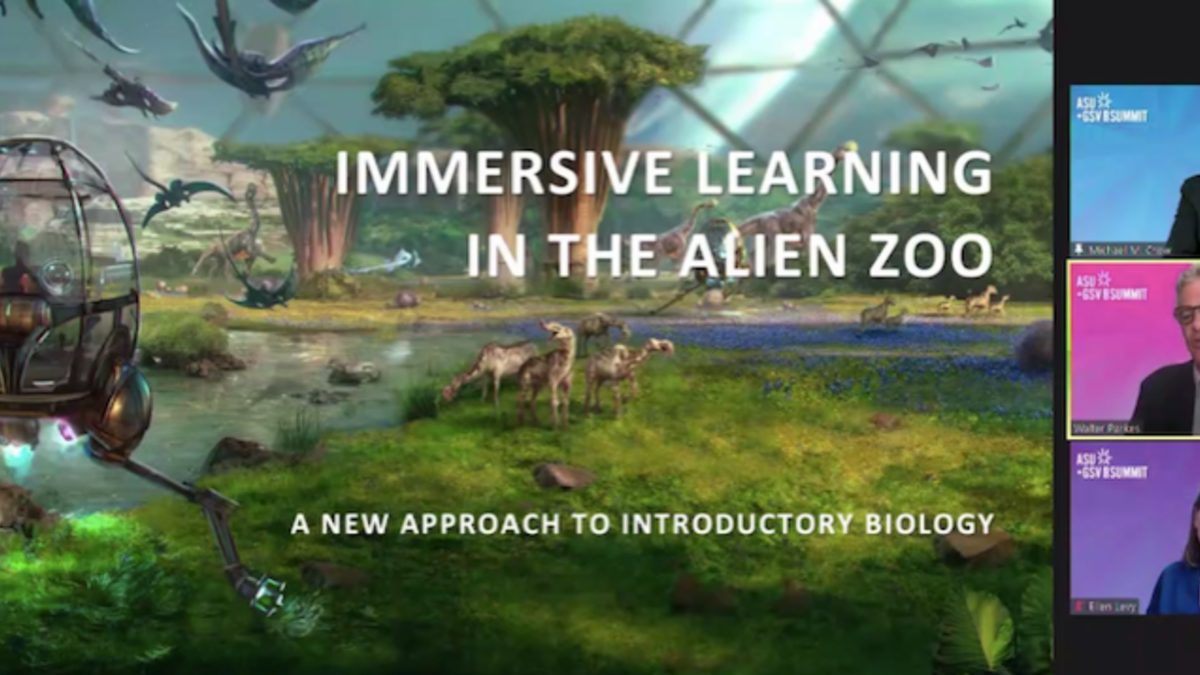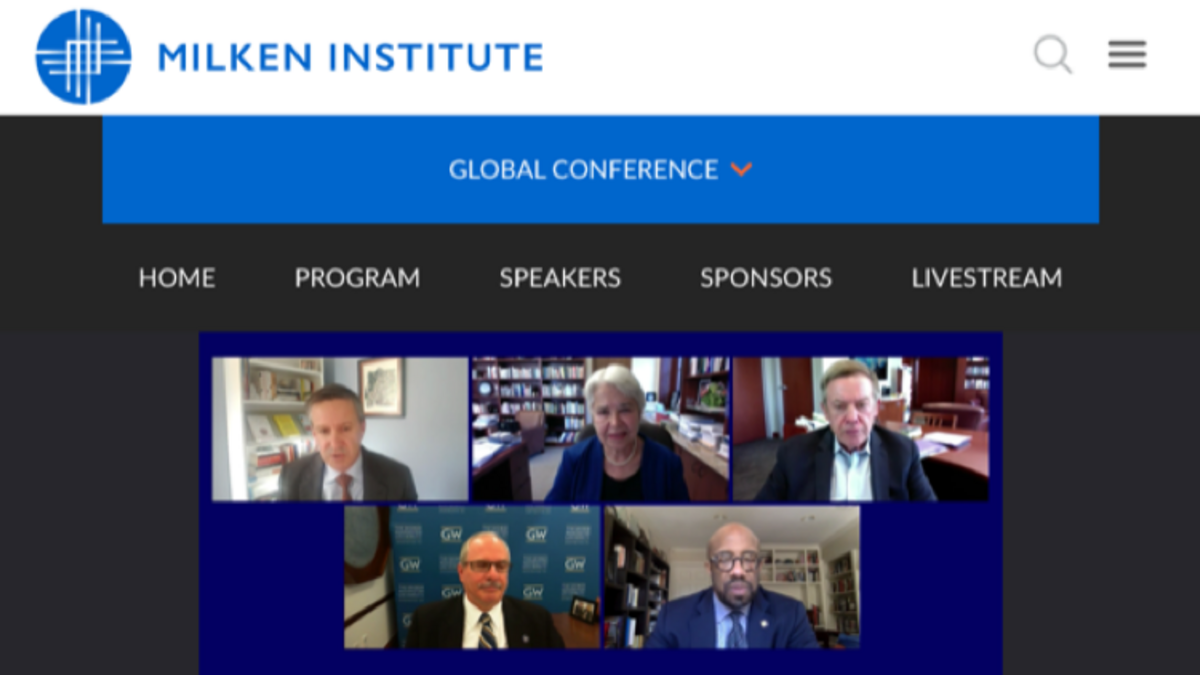
Updates from the President
Updates from President Crow: November 5, 2020
- Tohono O’odham Nation invests $1 million in ASU COVID-19 research
- Maricopa County’s face covering mandate is imperative and effective
- ASU + GSV Summit gives new audiences a look at the future of education
- College leaders answer “What’s next?” at Milken Institute Conference

Standing with Tohono O’odham Legislative Council Chairman Timothy Joaquin Gu Achi, Tohono O’odham Nation Chairman Ned Norris, Jr. and University of Arizona President Robert C. Robbins during the October 19 announcement. (Photo Credit: Arizona Board of Regents)
Tohono O’odham Nation invests $1 million in ASU COVID-19 research
Last week, I was honored to join the leadership of the Tohono O’odham Nation and the Tohono O’odham Legislative Council as they announced a commitment of $1 million dollars each to Arizona State University and the University of Arizona to advance our respective research efforts against COVID-19. In a joint press conference, Tohono O’odham Nation Chairman Ned Norris Jr. and Legislative Chairman Timothy Joaquin Gu Achi noted the persistence of the virus and its threat to public health and the economy in their decision to dedicate funds to the world-class pandemic research of Arizona’s universities.
As ASU continues to expand its groundbreaking saliva-based test technology and evolve new diagnostic tools , we are grateful for the Nation’s collaboration and support. As I said at the announcement, we are all in this fight together and science is the only way we can win. We must find ways to work together to develop new, reliable and timely solutions for the good of all, and I welcome your ideas as we push forward.

Maricopa County’s face covering mandate is imperative and effective
On a separate but related note, the Maricopa County Board of Supervisors recently contemplated potential changes to or the repeal of the mandatory face covering regulations it instituted last June. While ASU continues the diligent implementation its aggressive COVID-19 management strategy across its campuses, Arizona has begun to see an incremental increase in the number of new virus cases, meaning that we cannot afford to let our collective guard down.
To emphasize that message, I wrote to the Board urging that they stay on course and reject efforts to diminish or rescind their mandatory face covering regulations. Scientific evidence, including a July 2020 study published in the Journal of the American Medical Association, strongly supports the effectiveness of the widespread use of masks in reducing the spread and management of COVID-19. In my letter, I summarized that COVID-19 will be with us for the foreseeable future and the vast majority of Maricopa County residents understand the effectiveness of face coverings and support their use. Further, mask-wearing is critical to supporting Arizona’s workforce and economic health. Lastly, and especially important as we enter influenza season, continued mask wearing will help us to avoid the dangerous ramifications of a third spike in infections, hospitalizations and deaths.
The bottom line is that we know what existing mitigation strategies are effective and we share a civic responsibility to use them to protect the lives and livelihoods of all Arizonans.

Ellen Levy, Walter Parkes and I introduced Dreamscape Learn at the ASU + GSV Virtual Summit on September 29, 2020. (Photo Credit: Dreamscape Immersive / ASU)
ASU + GSV Summit gives new audiences a look at the future of education
Every year, ASU and Global Silicon Valley (GSV) come together to host a special summit that explores the impact of educational technology and the big picture future of education. Themed “The Dawn of the Age of Digital Learning,” this year’s summit went virtual due to COVID-19. Although we missed seeing everyone in person, the free and accessible new format made it possible for nearly 33,000 education, technology and administrative leaders from more than 133 countries to learn about the collaborations and innovations that are changing the face of modern learning.
During the three-day program, I sat down with National Public Radio education reporter and author Anya Kamenetz to talk about the “fifth wave” of American higher education, a concept I introduced at ASU + GSV in 2016 that underpinned ASU’s ongoing design as a national service university. My latest book details why we need higher education models that advance access and excellence simultaneously while speeding meaningful societal change, and ASU’s fast, technology-enhanced response to COVID-19 exemplifies that need.
I also had the pleasure of joining Walter Parkes, head of Dreamscape Immersive, to introduce our Dreamscape Learn partnership to the ASU + GSV audience. As I shared last month, our organizations have come together to develop the next frontier of virtual reality education and our discussion provides a first look at what this technology offers, including the “Alien Zoo” that will serve as the basis for our first biology course. I hope you will watch both talks and send me your ideas for moving ahead.

Discussing the future of higher education with Jeff Selingo and colleagues from UC Berkeley, George Washington University and Paul Quinn College on October 14. (Photo Credit: ASU)
College leaders answer “What’s next?” at Milken Institute Conference
As the global pandemic continues to unfold, the question of what’s next for higher education remains on the minds of many. To address present concerns and the needs brought to light by such rapid change, the Milken Institute dedicated a session at its recent annual global conference to asking public and private college leaders about their top concerns and their strategies for addressing them.
In a session titled “Ten Years in Ten Months: Accelerating the disruption of higher education,” and hosted by Jeffrey Selingo, I joined University of California, Berkeley Chancellor Carol Christ, George Washington University President Thomas LeBlanc, and Paul Quinn College President Michael Sorrell for a candid conversation about the challenges we have faced in 2020, what we have learned, and how our respective institutions are doing to continue fulfilling our mission and serving our students.
The lack of ubiquitous internet access on the national level, geographic and travel constraints, and the disparate impact of COVID-19 across student populations were all concerns, but from my perspective, the pandemic has magnified the disconnect between K-12 education and the capacity of higher education. It is critical that we find ways to project the knowledge core of our institutions via quality immersive environments to reach broad populations of learners. ASU Prep Digital and ASU For You are examples of our efforts to close this gap, but there is more to do. With the new knowledge gained this year, ASU will continue working to lead in this area.